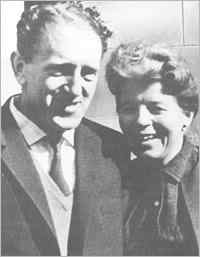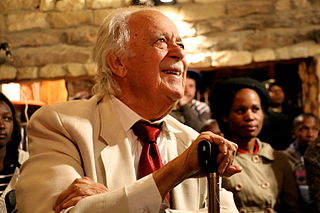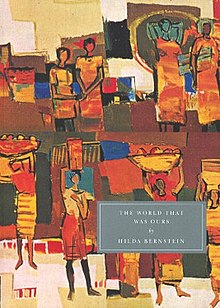The World that was Ours (1967) is Hilda Bernstein's personal account of life in Johannesburg under the oppressive surveillance of the apartheid regime. Hilda and her husband Rusty Bernstein were both detained, along with many others, in the aftermath of the Sharpeville massacre of 1960. Upon their release, Rusty was placed under house arrest, while Hilda's day-to-day activities were closely monitored by the Special Branch, if not altogether prohibited. Her memoir recalls these fraught years in the build-up to the landmark Rivonia Trial, the events and ordeals of the Trial itself, and finally the couple's reluctant decision to flee their beloved country in the wake of Rusty's acquittal.

Hilda Bernstein was a British-born author, artist, and an activist against apartheid and for women's rights.

Apartheid was a system of institutionalised racial segregation that existed in South Africa and South Africa-occupied Namibia from 1948 until the early 1990s. Apartheid was characterised by an authoritarian political culture based on baasskap, which encouraged state repression of Black African, Coloured, and Asian South Africans for the benefit of the nation's minority white population. The economic legacy and social effects of apartheid continue to the present day.

The Sharpeville massacre was an event which occurred on 21 March 1960, at the police station in the South African township of Sharpeville in Transvaal.
While on the one hand The World that was Ours offers vivid historical insight into the tumultuous climate of Johannesburg in the early 1960s, on the other it reads as a poignant and emotional recollection of the narrator's personal dilemmas, as a mother, a wife and a political activist, torn between her private and public responsibilities. 'This has survived as a South African classic,' wrote Anthony Sampson in the Spectator, 'not just because it's beautifully written, but because it conveys the combination of ordinariness and danger which is implicit in any totalitarian state.'
The World that was Ours is dedicated to 'the men of Rivonia' - Nelson Mandela, Walter Sisulu, Ahmed Kathrada, Denis Goldberg, Govan Mbeki, Elias Motsoaledi, Andrew Mlangeni and Rusty Bernstein - as well as to their devoted counsel, Bram Fischer.
The Rivonia Trial took place in South Africa between 9 October 1963 and 12 June 1964. The Rivonia Trial led to the imprisonment of Nelson Mandela and the others among the accused who were convicted of sabotage and sentenced to life at the Palace of Justice, Pretoria.

Nelson Rolihlahla Mandela was a South African anti-apartheid revolutionary, political leader, and philanthropist who served as President of South Africa from 1994 to 1999. He was the country's first black head of state and the first elected in a fully representative democratic election. His government focused on dismantling the legacy of apartheid by tackling institutionalised racism and fostering racial reconciliation. Ideologically an African nationalist and socialist, he served as President of the African National Congress (ANC) party from 1991 to 1997.

Walter Max Ulyate Sisulu was a South African anti-apartheid activist and member of the (ANC), African National Congress serving at times as Secretary-General and Deputy President of the organization. He was thrown in jail at Robben Island, where he served more than 25 years' imprisonment.

Umkhonto we Sizwe was the armed wing of the African National Congress (ANC), co-founded by Nelson Mandela in the wake of the Sharpeville massacre. Its mission was to fight against the South African government.

Govan Archibald Mvuyelwa Mbeki was a South African politician and son of Chief Sikelewu Mbeki and Johanna Mahala and also the father of the former South African president Thabo Mbeki and political economist Moeletsi Mbeki. He was a leader of the South African Communist Party and the African National Congress. After the Rivonia Trial, he was imprisoned (1963–1987) on charges of terrorism and treason, together with Nelson Mandela, Walter Sisulu, Raymond Mhlaba, Ahmed Kathrada and other eminent ANC leaders, for their role in the ANC's armed wing, Umkhonto we Sizwe (MK). He was sometimes mentioned by his nickname "Oom Gov".

Sandton is an affluent area situated in the Johannesburg Municipality, Gauteng, South Africa. The name comes from the combination of two of its suburbs, Sandown and Bryanston. In 1969 Sandton was promulgated as a municipality in its own right, but lost its status as an independent town after the re-organisation of South African local governments.
Abraham Louis Fischer, commonly known as Bram Fischer, was a South African lawyer of Afrikaner descent, notable for anti-apartheid activism and for the legal defence of anti-apartheid figures, including Nelson Mandela at the Rivonia Trial. Following the trial he was himself put on trial accused of furthering communism. He was sentenced to life imprisonment, and diagnosed with cancer while in prison. The South African Prisons Act was extended to include his brother's house in Bloemfontein where he died two months later.

George Bizos is a human rights lawyer who campaigned against apartheid in South Africa, most notably during the Rivonia Trial.

Ahmed Mohamed Kathrada, sometimes known by the nickname "Kathy", was a South African politician, political prisoner and anti-apartheid activist.
The Treason Trial was a trial in Johannesburg in which 156 people, including Nelson Mandela, were arrested in a raid and accused of treason in South Africa in 1956.
The following lists events that happened during 1963 in South Africa.
Elias Mathope Motsoaledi was a South African anti-apartheid activist and one of the eight men sentenced to life imprisonment at the Rivonia Trial in 1963. The Elias Motsoaledi Local Municipality in Limpopo province was named for him.

Denis Goldberg is a South African social campaigner, who was active in the struggle against apartheid and was imprisoned for 22 years, along with other key members of the anti-apartheid movement in South Africa. After his release in 1985 he continued to campaign against apartheid from his base in London with his family, until the system was fully disbanded with the 1994 election. He returned to South Africa in 2002.

Lionel "Rusty" Bernstein was a South African anti-apartheid activist and political prisoner.

Liliesleaf Farm in northern Johannesburg, South Africa, was the farm used secretly by African National Congress activists in the 1960s and was the location where many prominent African National Congress leaders were arrested, leading to the Rivonia Trial. Nowadays Liliesleaf Farm is a museum and world-famous heritage site, attracting many visitors annually, and rated as a top "things to do in Johannesburg" site.
The South African Congress of Democrats (SACOD) was a radical, left, white, anti-apartheid organization founded in South Africa in 1952 or 1953 as part of the multi-racial Congress Alliance, after the African National Congress (ANC) invited whites to become part of the Congress Movement.

Vernon Celliers Berrangé SCOT "Defender of the People" was an eminent South African human rights advocate (QC)
"I Am Prepared to Die" is the name given to the three-hour speech given by Nelson Mandela on 20 April 1964 from the dock of the defendant at the Rivonia Trial. The speech is so titled because it ends with the words "it is an ideal for which I am prepared to die". The speech is considered one of the great speeches of the 20th century, and a key moment in the history of South African democracy.
Christina 'Chrissie' Jasson was a South African clerk and trade unionist from Port Elizabeth, who stood accused of treason at the Rivonia Trial.
This page is based on this
Wikipedia article Text is available under the
CC BY-SA 4.0 license; additional terms may apply.
Images, videos and audio are available under their respective licenses.













